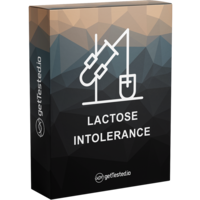Description
Food intolerance test 240 items This test measures 240 items for food hypersensitivity, for example; gluten, wheat, milk, soy, egg and oats. Please see the complete list of all foods tested below. Food intolerances and the gut If your result shows many food intolerances, that is often due to an underlying problem in the gut. In that case we recommend the test Gut Microbiome XL or the Leaky gut test to get an insight of any gut health imbalances. Food intolerance test 240 (IgG4) measures the following 240 foods: Perch Alaska pollock Amaranth Pineapple Duck Anchovy Orange Apricot Aubergine Avocado Banana Basil Blackberries Cauliflower Blueberry Blue mussels Broad beans Buckwheat Broccoli Brussels sprouts Stinging nettle Buffalo milk Camembert Cantaloupe melon Carob (locust bean) Cashew nut Chicory Lemon Lemongrass Cream cheese Curry (spice) Date Dill Dinkel Tarragon Durum wheat Edamer cheese Emmentaler cheese Pork Sheep’s milk Fennel Goat milk Goat’s milk cheese Gliadin Gluten Gouda ost Pomegranate Grapefruit Gruyere cheese Cream Green beans Green olives Green peas Kale Green tea Cucumber Goose Pike Pike-perch Raspberry Hazelnut Oat Catfish Abalone Sea buckthorn Millet Honey Honeydew melon Hops Lobster Halibut Horse meat Ginger Strawberry Almond Peanut Yeast Coffee Cocoa Turkey Veal Scallop Camomile tea Kamut Cinnamon Rabbit Chanterelle Caper Cardamom Carp Casein Chestnut Catnip Kelp Cottage cheese Kidney beans Chickpeas Kiwi Coconut Boiled milk Cow’s milk Coriander seeds Grain Red deer Artichoke Clove Allspice Hake Cumin King crab Cottage cheese Chicken Savory Kohlrabi Rutabaga Cherry Bay leaf Licorice Lamb Salmon Salmon caviar Lime Flaxseed Lentils Litchi Onion Macadamia nuts White turnip Corn Mackerel Malt Tangerine Almond Mango Dandelion Carrot Mozzarella Mung beans Nutmeg Nectarine Rose hip Beef Oyster Oyster mussel Papaya Brazil nuts Parmesan Passion fruit Pecan Peppermint Horseradish Peach Parsley Persimmon Turbot Pine nuts Pistachios Plum Grapefruit Potato Pumpkin Pumpkin seeds Leek Pear Quinoa Rhubarb Ramson Rape Rice Rosemary Ruccola Raisin Deer Rye Radish Shrimp Black radish Redcurrants Beetroot Red cabbage Cane sugar Salad Napa cabbage Sage Sardine Savoy cabbage Shallot Celery Mustard Sesame Shiitake mushrooms Herring Common sole Snail Soy Soy milk Sunflower seeds Asparagus Spinach Plaice Lumpfish caviar Ostrich Sauerkraut Black caviar Black tea Blackcurrant Black pepper Sweet lupins Thyme Squid Tofu Tomato Tuna Baker’s yeast Cod Cranberry Button mushroom Quail Poppy seeds Walnut Vanilla Whey Watermelon Wheat Wild boar Grape White Beans Cabbage Garlic Yoghurt Zucchini Eel Octopus Boletus Egg yolk Egg white Apple Trout The ELISA-method The food intolerance test is performed via a method called ELISA (enzyme-linked immunosorbent assay), which is an analytical technique designed to detect and quantify soluble substances such as peptides, proteins, antibodies and hormones. In this method, the antigen itself (the target macromolecule) is immobilised on a solid surface (microplate) and then complexed with an antibody that is linked to a reporter enzyme. Detection is accomplished by measuring the activity of the reporter enzyme via incubation with a suitable substrate to produce a measurable product. The most crucial element of an ELISA is a very specific antibody-antigen interaction. Food intolerance test at home All our tests including the Food Intolerance test are performed at home, and then sent to our lab for analysis. Your result will be received digitally. Before taking the test We recommend that you have been exposed to the foods included in the test within the last three months, before taking the test. If more than three months have passed without having ingested those foods, the chance is that it might show a lesser sensitivity to the result.

